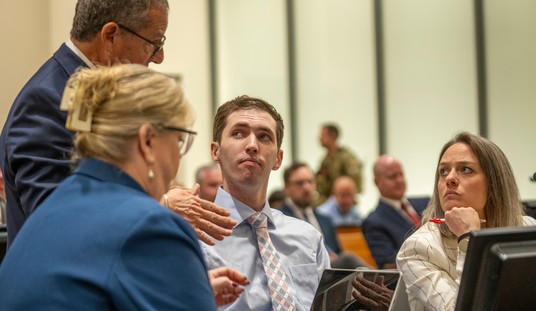And so the betrayal of the Kurds becomes a betrayal of Trump’s fans too. For days he hammered his stupid “end endless wars” talking point on Twitter to defend his decision to retreat from northern Syria before a Turkish onslaught against the Kurds. All I’m doing is keeping a campaign promise, he insisted. I told you on day one that I was going to get American troops out of harm’s way in the Middle East. We’ve spent too much blood and treasure policing these interminable regional conflicts. Pulling out of Syria in time for Erdogan to feed the Kurds into his meat grinder was just a way of putting America first.
There were problems with that argument. For starters, he wasn’t actually withdrawing any troops from Syria. He was moving troops stationed in the north to other parts of the country so that they weren’t in Turkey’s way. No one was coming home. Beyond that, there’s the small matter that he not only continues to support the interminable Saudi war on Yemen, he’s actually doing so over congressional objections. Twice now Congress has passed bills demanding that he end American assistance to the Saudis. Trump has vetoed those bills. Congress is making more of an effort to end U.S. involvement in one particular endless war in the Middle East than Trump is.
But for cripes sake, why would he make his stance on Turkey and the Kurds a matter of “ending endless wars” if he knew he was about to deploy more American troops to the region, specifically 1,800 more to Saudi Arabia? He didn’t have to. Like I said last night, he could have presented the Turkish offensive simply as a war between two allies which required the United States to remain studiously neutral. The Saudis, on the other hand, are pitted against Iran and its proxies, a more traditional conflict between a U.S. ally and a U.S. enemy. We can take sides in that one. Instead he invited all of his fans out on a limb in which the Kurdish betrayal was part of some master policy of extricating ourselves from the region’s problems, only to turn around and saw that limb off by deepening American involvement in the Saudis’ problems.
Stephen “redsteeze” Miller aptly calls this the “Shoot a person on Fifth Avenue and not lose a single supporter” test. Trump’s treating his own fans as rubes in asking them to look at the Saudi deployment in the context of supposedly ending endless wars and think, “Yeah, this all makes sense.”
“Secretary Esper informed Saudi Crown Prince and Minister of Defense Muhammad bin Salman this morning of the additional troop deployment to assure and enhance the defense of Saudi Arabia,” Chief Pentagon spokesman Jonathon Hoffman said in a statement Friday. “Taken together with other deployments, this constitutes an additional 3,000 forces that have been extended or authorized within the last month.”
The US has increased the deployment of forces in the region by 14,000 since May…
When the Pentagon announced additional deployments after the Saudi attack, Defense Secretary Mark Esper told reporters that the US troops would be “defensive in nature and primarily focused on air and missile defense.”
Remember this dopey soundbite from a few days ago?
What heroic effort did our Saudi friends make at Normandy, apart from continuing business as usual in selling us oil, to justify 1,800 more American troops being sent there now?
The president grasps at whatever rationale is nearest at hand to defend his policies, never mind whether he’s likely to contradict them a day later. Jonathan Tobin hits at a fundamental contradiction of his Middle East policy, and at his foreign policy generally. On the one hand, Trump wants to intimidate America’s enemies into doing his bidding; on the other hand, he’s an isolationist at heart and repeatedly telegraphs his interest in withdrawing abroad, including from longtime bases in places like Japan and Germany. You can “end endless wars” by withdrawing from everywhere and accept the regional consequences from the likes of Iran and China, finding comfort in the fact that at least our boys aren’t in the middle of it. Or you can carry a big stick and keep troops stationed abroad knowing that that creates a risk of being sucked into a major war at a time and place not of your choosing. But pick one.
The problem for Trump is not his willingness to listen to his neo-isolationist instincts. Rather it is that his desire to extricate America from the Middle East cuts against three other key goals of his regional policy: Defeating ISIS, pressuring Iran and scrapping the nuclear deal it signed with the Obama administration, and maintaining strong support for the state of Israel. He couldn’t beat ISIS and seek to isolate Iran and bolster Israel against its enemies while withdrawing from the Middle East. He chose appearing to do the latter over doing the former, endangering the success of his pressure campaign against Iran and potentially giving ISIS the opening it needs to make a comeback in the process…
Seen in this light, the “Normandy Doctrine” is merely an excuse by which any friend of the United States — including the Kurds, who have, despite their small numbers and the danger they have faced, proven both faithful and useful to American regional interests — can be discarded on a whim. Far from an expression of nationalist self-interest, it is a pretext for withdrawal not so much from potential wars but from the policies that will do the most to prevent them. Much like Barack Obama’s ignominious retreats from Syria and Iraq, which Trump has correctly pegged as the primary reasons for the rise of ISIS, the president’s foolish decision to abandon the Kurds may set in motion a chain of events that will drag him or a successor back into war in the Middle East.
Precisely right about the “Normandy Doctrine.” We could justify backstabbing virtually any ally on grounds that “they didn’t help us during [insert previous conflict here].” Even the Brits could be theoretically betrayed for refusing to lend a hand in Vietnam — although that would be an awkward talking point for Trump since he didn’t lend a hand either. Remember, in his eagerness to exploit grievances, the president once reportedly reminded Justin Trudeau during a conversation about U.S. tariffs on Canada that troops from his country once burned down the White House. That’s Trump to the core: He’s never the aggressor, never in the wrong. There’s always some slight or supposed malfeasance by his critic, like the Kurds somehow not showing up for D-Day, to justify his own bad policy in terms of just desserts.
The UN Security Council held a meeting yesterday on Turkey’s assault on the Kurds, by the way. Six members joined together to condemn it. The United States wasn’t one of them.
Update: Forgive me for my skepticism that this is an actual mistake. It smells like a “mistake” cooked up by Turkey to justify Trump’s decision to withdraw. Look what sort of accidents might happen if American troops were still there as a buffer between us and the Kurds.
Newsweek has learned through both an Iraqi Kurdish intelligence official and senior Pentagon official that Special Forces operating on Mashtenour hill in the majority-Kurdish city of Kobani fell under artillery fire from Turkish forces conducting their so-called “Operation Peace Spring” against Kurdish fighters backed by the U.S. but considered terrorist organizations by Turkey.
The senior Pentagon official said that Turkish forces should be aware of U.S. positions “down to the grid.” The official could not specify the exact number of personnel present, but indicated they were “small numbers below company level,” so somewhere between 15 and 100 troops.
Very strange that this mistake would be made if in fact Turkish troops know exactly where the Americans are. I figure there’s a 20 percent chance that Trump will show some indignation and an 80 percent chance he cites this “mistake” as proof that we were right to stand aside and enable the massacre of the Kurds.
A good question from Drew McCoy. What are U.S. troops still doing in the line of fire in the first place? We pulled out, I thought.
Update: CNN is reporting that “The artillery shells hit several hundred meters from where the US forces were located. There are no American injuries in the early reports and at this time no indication this was deliberate, the official said.”








Join the conversation as a VIP Member